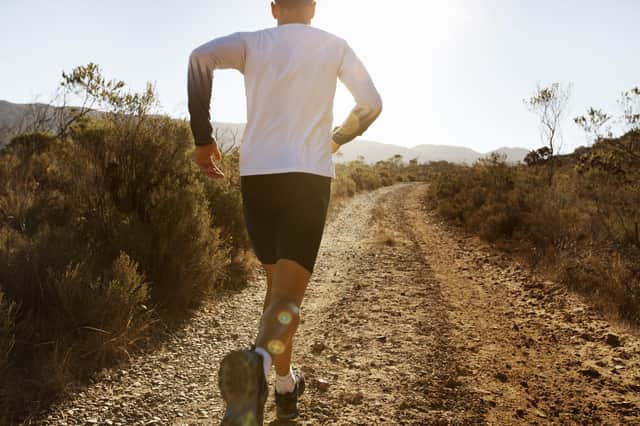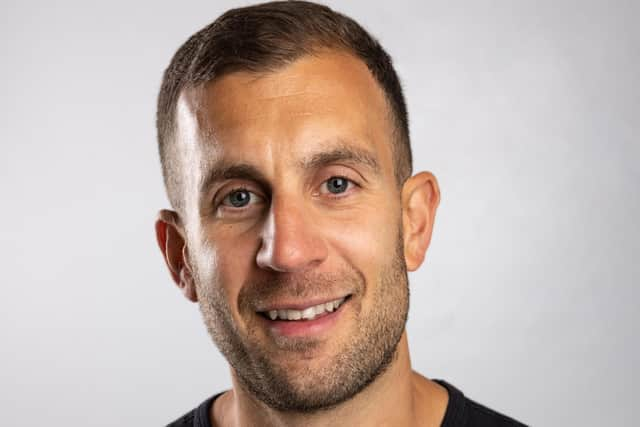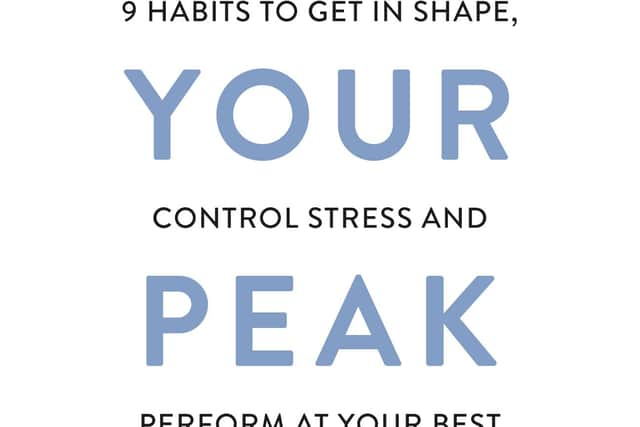'Run your body like a business' How to take up the fitness habit for new year


But fitness instructor Alex Pedley knows those good intentions fade fast. As a fitness coach for business people - over the last two decades, he's persuaded a variety of high flyers - and me - to get up from their desks for a few hours each week and attend to their wellbeing - he's seen plenty of people struggle to keep early momentum up.
His first book - Reach Your Peak - has been published just in time for this month of high hopes. In it, he urges people not to over-reach in the first, heady days of the New Year - but instead start small, and build their fitness up over time. He says building new habits, and an entirely new perception of yourself as the sort of person who takes exercise and eats healthily, is more important than simply shedding lots of weight after the festive binge.
Advertisement
Hide AdAdvertisement
Hide AdI sat down with Pedley to discuss the new book, and ask where we should all be starting. This exchange has been edited for clarity and length.


NM: What would you say is the underlying theme of the book?
AP: The book focuses on nine habits in three key areas that have been impacted by 21st Century living. Those areas are how we exercise, eat and recover. Each has a massive impact on our health, happiness and performance.
It is common for people to suffer from achy joints, feel out of shape, suffer from high stress and have trouble sleeping. Many of these things can be improved by focusing on building better habits. It’s not easy but it is achievable, and will be transformational.
The book essentially gives you a framework to follow to progressively implement these nine habits and make it work within a busy life.


NM: But these are difficult times: there's a pandemic, we're dealing with working in very different ways to before. Many people will just be trying to keep it together. Isn't striving for more going to be difficult?
AP: When we go through a big life change - and when I say a big life change I mean getting a new job, having a baby, managing through a pandemic - we do what we need to do to survive those periods. We go through a period of managing it, we exercise less, we grab food more on the go, our sleep routine will generally change, we tend to sleep less. We're just continuously keep pushing on, just to get through this period and stabilise.
That's fine if we can then switch back into old habits. But most people don't. So we continue with those habits.
And the problem is, from a stress point of view, we only have a certain tolerance, and that tolerance to stress is defined by many things, including the amount of stress we're under, our sleep quality, our nutrition, and how fit we are.
Advertisement
Hide AdAdvertisement
Hide AdSo if we can improve our wellness - become fitter, sleep better, get more mental downtime during the day, improve our nutrition - we will then be able to improve our tolerance to stress. And then, running alongside that, we will also get into better shape.
NM: And what is fit in your mind? What level do people need to achieve all these benefits?
AP: Fitness is relative. Relative to your age, to your goals. For me, purely from a fitness point of view, it is being aerobically fit - where you're able to run, or cycle a longer distance, and also be able to recover faster. Aerobic fitness is shown to be one of the biggest markers for longevity. It's massively important.
If we're talking about in shape, then it's relative - it's feeling confident in your body. It's being able to lift things without your lower back hurting, being able to run for a bus without feeling out of breath. It's about being able to use your body in the way that it was intended to be used, for whatever you need to use it for.
NM: Your book’s big on habits, but building habit is hard. How do you build up healthy habits when you’re busy with everything else in life?
AP: One key, key thing for me is starting small. There’s a really good book called Tiny Habits (Tiny Habits, by BJ Fogg), and it encourages you to start with the smallest possible thing you can. It’s the polar opposite of what we do in modern life. If people want to get fit today, they tend to go for quite a severe measures - high intensity training, restrictive diets. But starting small is important.
Then it’s about planning. We plan our working lives and business meetings carefully, but we don’t plan how we are going to exercise or when even going for a walk is going to fit into our diary. We don’t plan how to structure nutrition into our routine.
Another habit is to analyse what’s happening in your life and try to improve. We often analyse what happens from a business point of view. But we don’t really analyse what we are doing [for our health and wellbeing].
Advertisement
Hide AdAdvertisement
Hide AdNM: So you’re really applying some of the rules and routines of business to someone’s health?
AP: Yes, absolutely. One of the things I say in the book is to run your body as if it was a business.
NM: The marketing around high-intensity interval training (HIIT) is quite seductive - those programmes promise short bursts of activity, where you really knock yourself out. But you’re not a fan. Why is that?
AP: I’m a fan of HIIT for the right person, at the right time, if it’s done in the right way. HIIT is a short workout and it’s intense, and what it’s meant to do - and what the studies show - is that it can get us in shape a lot faster. But a lot of these studies are done on people who are potentially athletes, or who are younger people who are able to tolerate that sort of exercise.
What’s happening in many of the classes is that people are pushing their clients for 30 seconds, with a 30 second recovery. But if someone’s out of shape, that’s not enough [recovery] so all they’re doing is staying in the anaerobic zone, with an elevated heart rate, for the whole period. That doesn’t improve their aerobic base.
You need to, progressively, keep building. If you get past the first three months, which is the worst part of starting anything new - a job, a child, anything that’s a shift in the way our routine is constructed - it gets better. Everything gets better. You’re fitter, you’re seeing the benefit, it’s becoming a bit more habitual.
NM: OK. So we’re full of good intentions at this time of year. How you do start?
AP: My first step is to evaluate. To work out where you are now. I’m a massive believer in keeping a food diary. It's essential because you can only change what you understand. If you track your food for a while a get an idea of when you’re eating and why you’re eating at certain times. You can start to learn how to adapt.
Advertisement
Hide AdAdvertisement
Hide AdThen work out. If you’re not training, start with one session of 20 minutes. If you do one session that’s 20 minutes, and then you can move to two sessions that are 20 minutes, you are winning. Psychologically, that’s a massive thing.
Reach Your Peak: 9 habits to get in shape, control stress and perform at your best, by Alex Pedley, is published by Rethink Press.